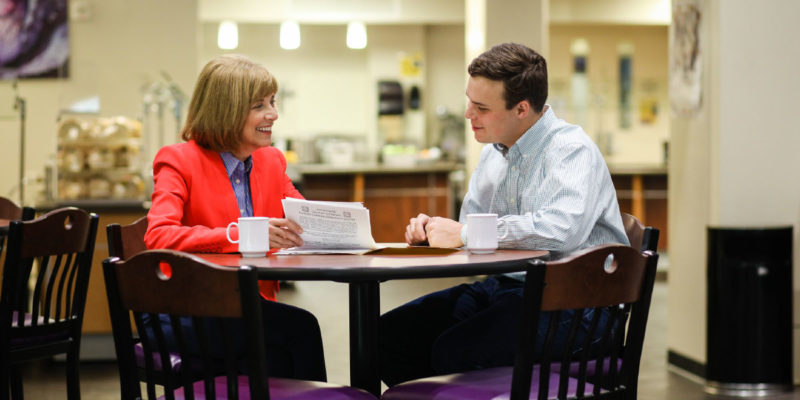How many students line up a promising job a year before graduation? Or receive three prestigious internships?
Meet Crawford B. Lewis, a teaching assistant at Wake Forest University, where he will earn his master of science degree in accountancy (taxation) in May 2018. He’s a former student at Furman University, Greenville, S.C., where he graduated magna cum laude and received his bachelor of arts degree in accounting in May 2017.
In the last couple of years, Lewis has made the grade during three internships. Last summer, he completed a stint at Ernst & Young as a tax intern. His work supporting client deliverables led to a job offer, which he has already accepted. The three-time intern starts a full-time job in tax at the Atlanta office beginning January 2019.
In the summer of 2016, Lewis went to Washington, D.C., as an intern for the human resources and tax policy subcommittees of the U.S. House Ways and Means Committee. In that capacity, he attended meetings and IRS hearings on Section 385 regulations, supported subcommittee staff and members in their research and preparation for hearings, and drafted language for House legislation and committee task force reports.
From March 2015 to January 2017, he served as an unpaid intern—and the only student representative—on Furman’s dining steering and contracting committee.
Tell us about your experience as an intern at Furman.
My involvement with the business office at Furman related to RFPs for dining services. Furman has a four-year residency requirement that requires students living on campus to have a meal plan. Because of this requirement, dining is always on students’ minds. As the only student on the RFP committee, my role was to provide the student perspective.
The experience opened my eyes to how a university functions, and the importance of business operations. Seeing the whole RFP process from start to finish, with all its moving parts, was amazing. I learned that it takes a long time to ensure that you have the right contract. I also learned that margins are thin in the food provider industry, creating a very competitive market.
We had eight responses to the RFP and pursued four of them. We ended up traveling to three schools—Lafayette College, Lehigh University, and Colgate University—for surprise visits, where we talked to school representatives, usually the manager of school dining services. The visits allowed us to see how providers implement on a day-to-day basis—not just on paper—to meet the needs of the school and students. We wanted the best student experience, while also considering the cost.
How did you land that appointment?
I was the treasurer of my class on student government. When representatives of dining services came to our student government meetings, they found me diplomatic and reasonable and recommended me for the internship.
So, what happened? Did you keep the same food vendor?
No. We switched to a firm that specializes in corporate and private educational clients. They started as a catering company, so the emphasis has always been on the food, particularly food that is local. The company’s food preparation takes culinary skill, so when the new contract started, the company trained employees on how to cook from scratch instead of just preparing dishes.
We thought they were a good match for our students, and it would distinguish us from similar schools. During the process, we announced the companies being considered, and our students really gravitated toward what the company offered.
How important is it to get student input in these kinds of decisions?
It’s paramount. If we had kept the same vendor, students would have questioned that decision. At the end of the day, institutions are here to serve the needs of their students (i.e. the customer). Even if something seems like a good idea, if it doesn’t align with the institution’s culture or the students’ vision, it won’t work. When students feel like their voices are being heard, it creates buy-in.

Did you feel like your voice had value?
Absolutely. I attribute that to the administrators on the committee. They were very welcoming and urged me to offer my opinions and thoughts throughout the process, because they knew how important the student perspective was to the final decision.
What advice can you offer to business officers who want to improve their internships?
The business office contains so many functions and opportunities. I suggest talking to your interns to determine their interests. By tailoring the internship to their interests, the students—and you—will benefit.
What kind of time commitment did your Furman internship require?
It fluctuated. A few weeks we didn’t have any activity. Another week, I missed school for three days to go out of town for the on-site visits.
When you started your internship what surprised you the most?
The committee’s commitment and willingness to make sure that we made the right decision. We weren’t forced into a rushed deadline. We were encouraged to put thought into it and to spend time brainstorming the aspects we considered important.
In general, do you think students have enough say about their institution’s policies?
Not really. I believe students are more open to changes when they feel included in the process. Sometimes administrators lose perspective because they are so far removed from being an actual student. Including students from the very beginning in decision-making processes benefits the institution, and allows everyone to be part of the dialogue.
What do you think about the outcry occurring on some campuses over certain visiting speakers?
An open dialogue is always better. Colleges and universities have a reputation for being a space for free thought. When a university invites a guest speaker, the speaker should be able to address the audience without worrying about his or her personal safety or the safety of students.
At Furman, I was thankful that we invited a number of diverse speakers as part of the Cultural Life Program. Before they graduate, students must go to 32 different lectures, performances, and university events. Of course, some students complained about the requirement, but the program successfully empowers students to learn about new topics, see the other side of issues, and go to events they otherwise wouldn’t attend.
How have your internships been influential in your career path?
I have been blessed to have internship opportunities in private, not-for-profit, and governmental entities. They have continuously confirmed my interest in accounting and taxation.
Nationwide, what can institutions do to improve?
I think institutions need to stay up-do-date on evolving workforce skills. They need to focus not only on liberal arts, but also on concrete skills that will help their graduates secure post-graduation employment.
I would like to see institutions integrate critical skills, such as personal finance, Excel, and data analytics, into their curriculums. Students need a strong traditional educational background combined with cutting-edge skills that will put them at the head of the workforce. No matter the discipline of their work, these skills will be utilized.
What can institutions do to make the initial adjustment period on campus easier?
In addition to orientation week, they can give students easy opportunities to get involved on campus, such as activity fairs. There is absolutely a place for everyone on campus, but sometimes students just don’t know where to go to find their niche.
The friends that students make and the experiences that they have early on are fundamental to their adjustment and long-term happiness on—and off—campus.
MARGO VANOVER PORTER, Locust Grove, Va., covers higher education business issues for Business Officer.



